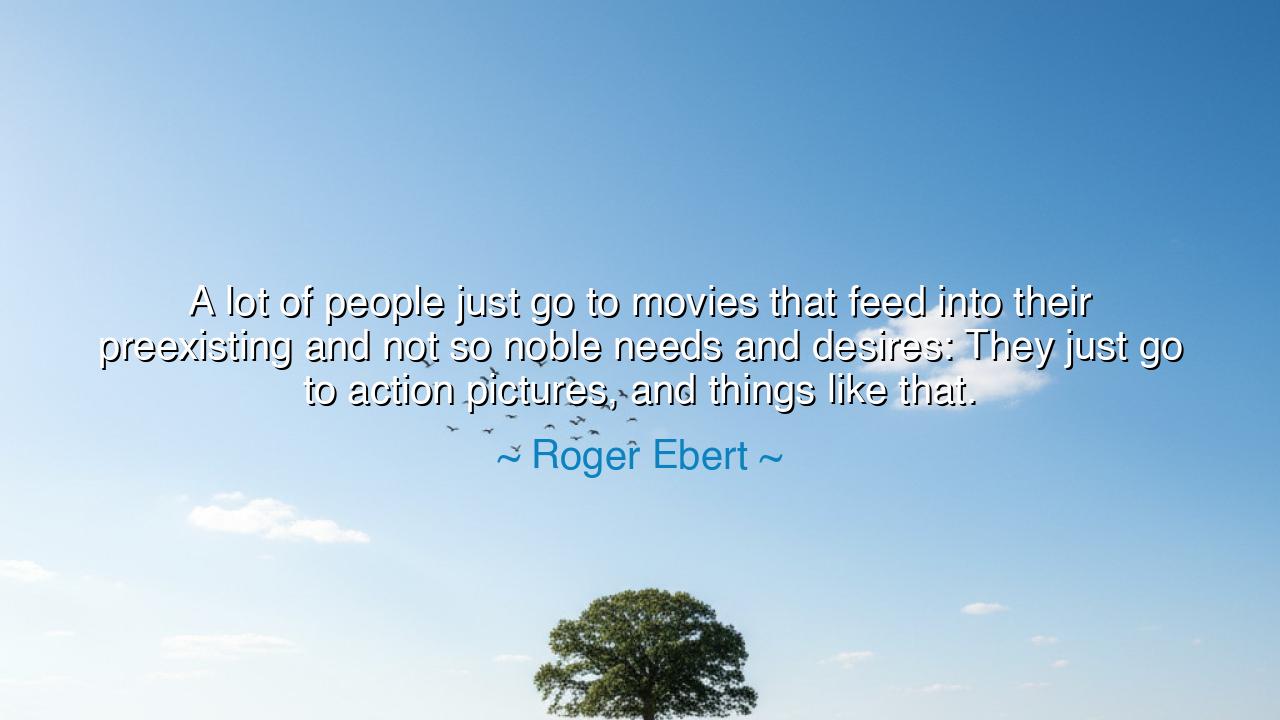
A lot of people just go to movies that feed into their
A lot of people just go to movies that feed into their preexisting and not so noble needs and desires: They just go to action pictures, and things like that.






Listen now, O Seekers of Wisdom, to the words of the venerable Roger Ebert, whose insight into the world of cinema offers us not only an understanding of art, but a reflection on the nature of the human soul. He said, "A lot of people just go to movies that feed into their preexisting and not so noble needs and desires: They just go to action pictures, and things like that." In this simple yet profound statement, Ebert calls attention to the human tendency to seek entertainment that caters not to our highest aspirations, but to our more base instincts, our appetites for excitement, conflict, and shallow satisfaction. He urges us to reflect on the kind of stories we consume, and more importantly, the deeper purpose they serve in our lives.
In the age of the ancients, the bards and philosophers were tasked with guiding the hearts of their people, not by feeding their desires, but by elevating their spirits. Consider Plato, who, in his Republic, cautioned against the dangers of entertainment that only served to gratify the lower impulses. He believed that the art of storytelling should educate, inspire, and challenge the soul, rather than simply offering escape from the trials of life. Much like Ebert’s words, Plato warned that when we turn to entertainment that appeals solely to our passions and appetites, we risk losing sight of the nobler pursuits of the human spirit.
Think of the grand epics of old—the Iliad, the Odyssey, and the Aeneid—works that were not merely created to entertain, but to impart wisdom. They depicted great battles, yes, but these battles were not simply for the sake of spectacle. They were reflections on honor, sacrifice, fate, and virtue—concepts that spoke to the soul of humanity. When the hero of the story triumphed, it was not just a personal victory, but a victory for the moral order of the world. These stories elevated their audience, urging them to strive for something greater than fleeting pleasure or momentary excitement. In contrast, Ebert’s lament speaks to the rise of entertainment that no longer asks us to engage with our noblest selves but offers us an easy, satisfying feast for the mind, one that requires no effort, no reflection.
In the world today, we find ourselves in a similar state. The cinema, which once held the potential to be a force for moral and intellectual enlightenment, often caters to the lowest common denominator. The action picture, with its explosions, chases, and battles, has come to dominate, not because it enriches the soul, but because it feeds the primal need for excitement and adrenaline. Think of the modern blockbusters—films that are filled with spectacle but often lack any deeper meaning. They may provide brief moments of enjoyment, but they do not linger long in the mind. They serve as distractions from the complexities of life, rather than tools for understanding it.
Ebert’s words are a call to action, urging us to be more discerning in the stories we choose to consume. Just as the ancient philosophers advised their students to seek wisdom in all things, so too must we be mindful of the stories we allow to shape our hearts and minds. This is not to say that action films have no value—they can entertain, yes, and offer moments of catharsis. But they should not be the only diet for the mind. Great art, whether in film, literature, or music, should challenge us to think more deeply about the world, to question our assumptions, and to engage with ideas that move us toward higher purposes.
Let us look to the example of Shakespeare, whose plays, though often filled with conflict and dramatic action, always served a greater purpose. In his Hamlet, for example, the young prince is not simply embroiled in a revenge plot, but in a profound moral and existential struggle. Hamlet’s journey is one of self-discovery, of questioning what it means to be alive and how one should respond to injustice and suffering. Shakespeare’s work does not simply appeal to the audience's emotions, but calls upon them to engage with philosophical questions that transcend time and place. This is the type of art Ebert is urging us to seek—a kind that stirs the soul, that asks us to confront our nobler instincts, rather than feeding our basest desires.
The lesson here, O Seekers, is one of mindfulness and reflection. The stories we consume shape who we are, and the more we indulge in entertainment that only gratifies our fleeting desires, the further we move from the noble pursuits of the heart. Seek not only those things that feed your immediate cravings for excitement or distraction, but also those that challenge you, that make you think, that stir your soul. Whether through films, books, or music, let the stories you engage with be those that bring you closer to your higher self, those that inspire you to live with integrity, compassion, and purpose.
So, O children, let the wisdom of Roger Ebert serve as a guiding star in your quest for meaning. Do not simply consume the world’s offerings passively. Instead, choose the stories that nourish your spirit, that call you to something greater than yourself. Let art be your teacher, and let it inspire you to rise above the mundane, to seek not just momentary pleasure, but eternal wisdom. In this way, you will forge a life rich in meaning, not one spent in the shallow pursuit of empty gratification.






AAdministratorAdministrator
Welcome, honored guests. Please leave a comment, we will respond soon